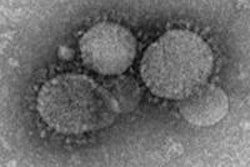The Middle East respiratory syndrome coronavirus (MERS-CoV) infects camels, researchers from the Netherlands and Qatar have reported this week in the Lancet Infection Diseases.
Using gene-sequencing techniques, the study team showed that three camels from a site where two humans contracted MERS-CoV were infected with the virus. The research suggests that the small livestock barn in Qatar was the location of an outbreak of MERS first detected in October. The barn's owner, a 61-year old man, was diagnosed with MERS-CoV infection, followed by a 23-year old male employee of the barn.
The virus sequences were very similar, although not identical, to those identified in the two humans at the site. The researchers also found that all 14 of the camels tested at the site had antibodies to MERS-CoV, suggesting the virus might have been circulating among the animals for some time, allowing most of them to build up immune protection against infection.
The authors noted that based on the current data, they can't determine whether the humans on the farm were infected by the camels or vice versa. A further possibility remains that humans and camels could have been infected from a third as yet unknown source, they said in a statement.
A more detailed analysis of the outbreak is ongoing, and is including testing of additional animals and environmental samples as well as attempts to obtain full MERS-CoV genomes of the human and animal specimens, according to the authors. They also said they cannot rule out that other livestock species are involved in the spread of MERS-CoV, and recommended a detailed case history including review of any animal exposures (including animal products) and targeted prospective serosurveys be performed to determine what risk factors -- other than contact with an infected person -- are associated with human infection.
An understanding of the role of animals in the transmission of MERS-CoV is urgently needed to inform control efforts, the authors said.



















